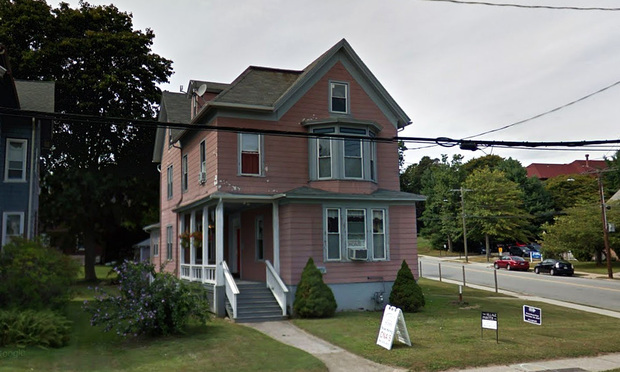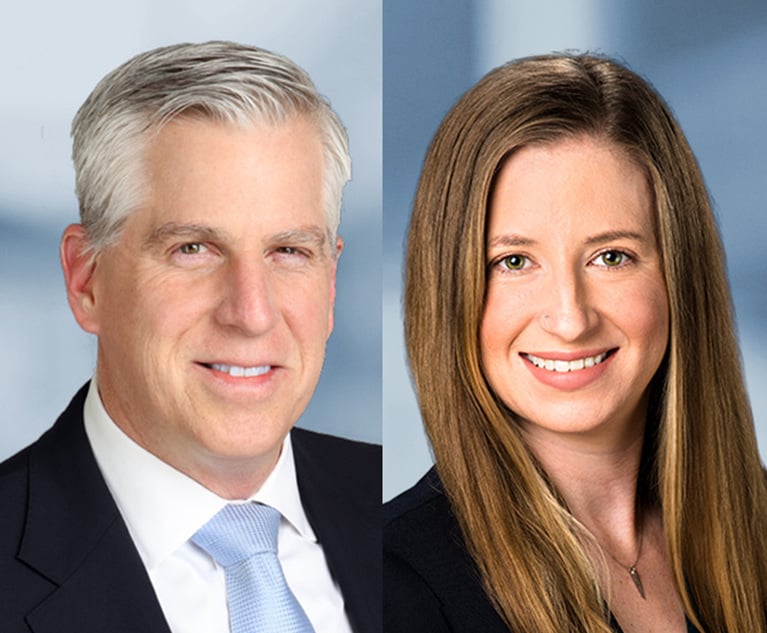Paid for Sleeping? US Department of Labor Overtime Suit Factors in Workers' Overnight Stints
The U.S. Department of Labor is suing New London-based Care At Home LLC for allegedly not paying overtime to employees who sometimes worked more than 100 hours per week.
April 25, 2018 at 04:52 PM
5 minute read

Trouble is brewing for a New London-based home care business caught in the federal government's crosshairs in a case that will test overtime requirements for employees who spend the night where they work.
A new federal lawsuit by the U.S. Department of Labor alleges Care At Home LLC founder Suzanne Karp and her husband Daniel did not pay overtime for employees who sometimes worked more than 100 hours a week.
The complaint lists 51 employees who the Department of Labor alleges is owed back pay. The lawsuit was filed Tuesday in U.S. District Court for the District of Connecticut.
The complaint by Department of Labor senior trial attorney Theresa Schneider Fromm cites several alleged violations, including instances where about 10 employees worked between 48 and 112 hours, but were paid straight time, or regular wages, for all hours.
Veteran employment attorney Richard Hayber, who is not involved in the litigation, says Care At Home could have a difficult time arguing it did not violate the federal Fair Labor Standards Act of 1938, if its payroll files indicate otherwise.
“Wage and hourly cases are, in some ways, easy to prove because there are records,” said Hayber, who heads the Hayber Law Firm in Hartford and New Haven. “Someone can just show their pay stubs and you can see the hours they worked. The point of contention is usually whether or not individual employees are entitled to overtime.”
The workers are primarily caregivers engaged in domestic service in private homes, including sleeping in the homes.
Potential bad news for Care At Home: The Department of Labor's website states that domestic service employees are entitled to overtime for compensable work time.
Hayber also noted the department's decision to sue not only the company, but also the individual owners.
“I don't see it very much,” he said. “That has been my experience. They [Department of Labor attorneys] choose wisely how to use scarce resources.”
A key point worth watching: Some of the employees counted the time spent sleeping at the homes among their work hours. That part of the lawsuit could be problematic for the government, according to Hayber.
“I'm not sure employees get paid to sleep,” he said. “It adds another legal test: whether or not they will win for damages while sleeping.”
The lawsuit seems to anticipate this. “If [sleep] interruptions are so frequent that the employee cannot sleep for at least five hours uninterrupted, defendants' policy states that the entire sleep period will be considered work time and compensable,” the complaint states.
The lawsuit also states the business wrongfully deducted $33 per day for food and lodging to its employees. “These deductions were not supported by any records explaining the calculations for those deductions,” the complaint reads.
Neither Suzanne nor Daniel Karp responded to a request for comment Wednesday. But the couple later denied any wrongdoing, via an answer through their attorney, Akerman New York labor and employment associate Vincent M. Avery. It said the company complied with Department of Labor's regulations, which permit employers to exclude sleep stints from paid time in some instances.
Under Department of Labor guidelines, exclusions include circumstances where the employer provides adequate accommodation for sleeping, situations where employees sleep uninterrupted for several hours, and arrangement with expressed or implied agreements to exclude sleep time.
“In this case, defendants are confident that all three elements have been met,” Avery wrote in the statement. “In fact the complaint itself acknowledges as much, when it states that defendants had a specific policy in place under which 'sleep time of eight hours is excluded and not compensated, when the employee has been provided an adequate sleeping facility and can generally enjoy an uninterrupted night's sleep.' This policy mirrors the language of the Department of Labor's own guidance on when it is appropriate for employers to deduct sleep time from compensable work time.”
Care At Home also denied allegation it made illegal deductions to employees' wages. It said the deductions were lawful to cover lodging and meals, in accordance with federal regulations
The “defendants are confident they will be vindicated at the conclusion of this case,” Avery said.
The lawsuit covers the period beginning in November 2015 under a provision that tacks additional time to the two-year statute of limitations window to bring FLSA claims.
“You could get a third year under the act if you allege and prove a willful violation of the act, showing a total disregard of people's rights,” Hayber said.
The lawsuit seeks an award of liquidated damages, which would double the alleged unpaid overtime compensation owed.
“The defendants can avoid liquidated damages by proving they made a good-faith effort to learn and comply with the law,” Hayber said. “That can include asking a lawyer or a seasoned HR professional.”
The government's attorney, Fromm, did not respond to a request for comment Wednesday. Edwin Nieves, the department's media contact for the wage and hour division, did not provide a comment by press time.
This content has been archived. It is available through our partners, LexisNexis® and Bloomberg Law.
To view this content, please continue to their sites.
Not a Lexis Subscriber?
Subscribe Now
Not a Bloomberg Law Subscriber?
Subscribe Now
NOT FOR REPRINT
© 2025 ALM Global, LLC, All Rights Reserved. Request academic re-use from www.copyright.com. All other uses, submit a request to [email protected]. For more information visit Asset & Logo Licensing.
You Might Like
View All
Inherent Diminished Value Damages Unavailable to 3rd-Party Claimants, Court Says
3 minute read


Trending Stories
- 1Uber Files RICO Suit Against Plaintiff-Side Firms Alleging Fraudulent Injury Claims
- 2The Law Firm Disrupted: Scrutinizing the Elephant More Than the Mouse
- 3Inherent Diminished Value Damages Unavailable to 3rd-Party Claimants, Court Says
- 4Pa. Defense Firm Sued by Client Over Ex-Eagles Player's $43.5M Med Mal Win
- 5Losses Mount at Morris Manning, but Departing Ex-Chair Stays Bullish About His Old Firm's Future
Who Got The Work
J. Brugh Lower of Gibbons has entered an appearance for industrial equipment supplier Devco Corporation in a pending trademark infringement lawsuit. The suit, accusing the defendant of selling knock-off Graco products, was filed Dec. 18 in New Jersey District Court by Rivkin Radler on behalf of Graco Inc. and Graco Minnesota. The case, assigned to U.S. District Judge Zahid N. Quraishi, is 3:24-cv-11294, Graco Inc. et al v. Devco Corporation.
Who Got The Work
Rebecca Maller-Stein and Kent A. Yalowitz of Arnold & Porter Kaye Scholer have entered their appearances for Hanaco Venture Capital and its executives, Lior Prosor and David Frankel, in a pending securities lawsuit. The action, filed on Dec. 24 in New York Southern District Court by Zell, Aron & Co. on behalf of Goldeneye Advisors, accuses the defendants of negligently and fraudulently managing the plaintiff's $1 million investment. The case, assigned to U.S. District Judge Vernon S. Broderick, is 1:24-cv-09918, Goldeneye Advisors, LLC v. Hanaco Venture Capital, Ltd. et al.
Who Got The Work
Attorneys from A&O Shearman has stepped in as defense counsel for Toronto-Dominion Bank and other defendants in a pending securities class action. The suit, filed Dec. 11 in New York Southern District Court by Bleichmar Fonti & Auld, accuses the defendants of concealing the bank's 'pervasive' deficiencies in regards to its compliance with the Bank Secrecy Act and the quality of its anti-money laundering controls. The case, assigned to U.S. District Judge Arun Subramanian, is 1:24-cv-09445, Gonzalez v. The Toronto-Dominion Bank et al.
Who Got The Work
Crown Castle International, a Pennsylvania company providing shared communications infrastructure, has turned to Luke D. Wolf of Gordon Rees Scully Mansukhani to fend off a pending breach-of-contract lawsuit. The court action, filed Nov. 25 in Michigan Eastern District Court by Hooper Hathaway PC on behalf of The Town Residences LLC, accuses Crown Castle of failing to transfer approximately $30,000 in utility payments from T-Mobile in breach of a roof-top lease and assignment agreement. The case, assigned to U.S. District Judge Susan K. Declercq, is 2:24-cv-13131, The Town Residences LLC v. T-Mobile US, Inc. et al.
Who Got The Work
Wilfred P. Coronato and Daniel M. Schwartz of McCarter & English have stepped in as defense counsel to Electrolux Home Products Inc. in a pending product liability lawsuit. The court action, filed Nov. 26 in New York Eastern District Court by Poulos Lopiccolo PC and Nagel Rice LLP on behalf of David Stern, alleges that the defendant's refrigerators’ drawers and shelving repeatedly break and fall apart within months after purchase. The case, assigned to U.S. District Judge Joan M. Azrack, is 2:24-cv-08204, Stern v. Electrolux Home Products, Inc.
Featured Firms
Law Offices of Gary Martin Hays & Associates, P.C.
(470) 294-1674
Law Offices of Mark E. Salomone
(857) 444-6468
Smith & Hassler
(713) 739-1250










